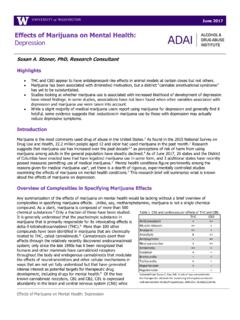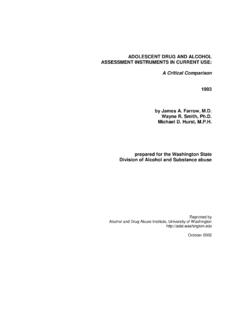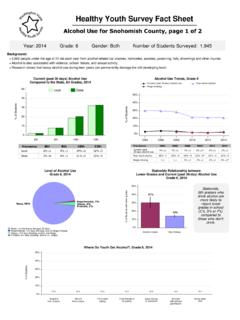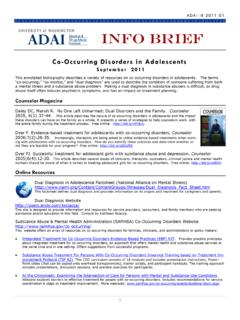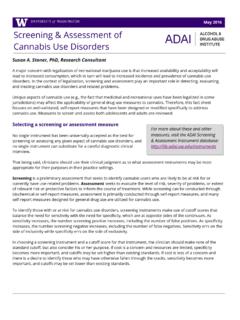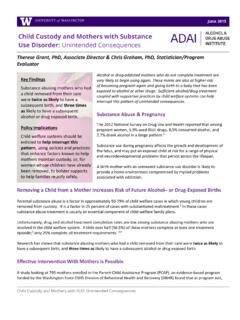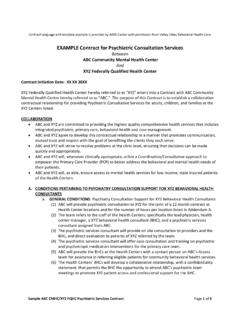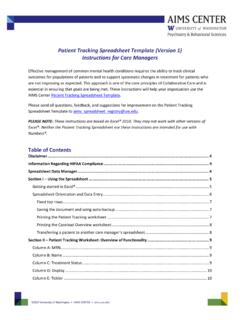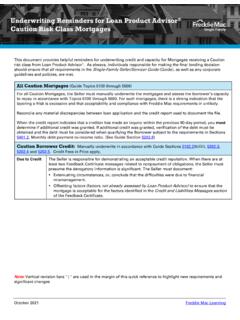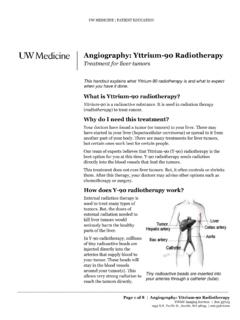Transcription of Effects of Marijuana on Mental Health: Anxiety Disorders
1 June 2017. Effects of Marijuana on Mental health : Anxiety Disorders Susan A. Stoner, PhD, Research Consultant Highlights Many people report using Marijuana to cope with Anxiety , especially those with social Anxiety disorder. THC. Considering appears Locked to decrease vs. Unlocked at lower doses and increase Anxiety at higher doses. anxietyFacilities Treatment CBD appears to decrease Anxiety at all doses that have been tested. There are individual differences in responses to Marijuana that are affected by a variety of factors, though tolerance develops over a short period of time with regular use.
2 Using Marijuana to cope with Anxiety may offer some short-term benefit, but well-controlled studies indicate that use of Marijuana is associated with increased likelihood of substance use Disorders . Introduction Marijuana is the most commonly used drug of abuse in the United States. 1 As found in the 2015 National Survey on Drug Use and health , million people aged 12 and older had used Marijuana in the past month. 1 Research suggests that Marijuana use has increased over the past decade 2-4 as perceptions of risk of harm from using Marijuana among adults in the general population have steadily declined.
3 4 As of June 2017, 26 states and the District of Columbia have enacted laws that have legalized Marijuana use in some form, and 3 additional states have recently passed measures permitting use of medical Marijuana . 5 Mental health conditions figure prominently among the reasons given for medical Marijuana use 6, yet there is a dearth of rigorous, experimentally controlled studies examining the Effects of Marijuana on Mental health conditions. 7 This research brief will summarize what is known about the Effects of Marijuana on Anxiety Disorders . Overview of Complexities in Specifying Marijuana Effects Any summarization of the Effects of Marijuana on Mental health would be lacking without a brief overview of complexities in specifying Marijuana Effects .
4 Unlike, say, methamphetamine, Marijuana is not a single chemical compound. As a plant, Marijuana is composed of more than 500. chemical Only a fraction of these have been studied. It is generally understood that the psychotropic substance in Marijuana that is primarily responsible for its intoxicating Effects is delta-9-tetrahydrocannabinol (THC).9 More than 100 other compounds have been identified in Marijuana that are chemically related to THC, called Cannabinoids exert their Effects through the relatively recently discovered endocannabinoid system; only since the late 1980s has it been recognized that humans and other mammals have cannabinoid receptors throughout the body and endogenous cannabinoids that modulate the Effects of neurotransmitters and other cellular mechanisms in ways that are not yet fully understood but that have generated intense interest as potential targets for therapeutic drug development, including drugs for Mental Of the two known cannabinoid receptors, CB1 and CB2, CB1 is expressed abundantly in the brain and central nervous Effects of Marijuana on Mental health .
5 Anxiety Disorders system (CNS) while CB2 expression is low in the CNS but high in peripheral immune cells and tissues. 10 Psychoactive Effects of Marijuana are attributed to CB1 receptors whereas CB2 receptors are , 10. Aside from THC, the most studied phytocannabinoid is cannabidiol (CBD). 11 CBD has been described as nonpsychotropic due to the fact that it appears to be non-intoxicating and non-reinforcing, but it does appear to be psychotropic insofar as it appears to have pharmacological benefits with regard to Anxiety , schizophrenia, addiction, and Table 1 summarizes the major CNS and cardiovascular Effects of THC and CBD.
6 11 CBD has been demonstrated to attenuate certain Effects of THC, including intoxication, sedation, and In modern clinical trials, this has permitted the administration of higher doses of THC in an effort maximize therapeutic Effects while minimizing side It is largely unknown how the interaction of THC and CBD plays out in practical use of Marijuana by medicinal and recreational Marijuana users. Research on cannabis products seized by the US Drug Enforcement Agency (DEA) shows that the potency of Marijuana in common use has increased dramatically in the last 2 decades, at least in terms of THC.
7 As shown in Figure 1, from 1995 to 2014, the average THC. content of seized cannabis products virtually tripled from approximately 4% to approximately 12%.8 On the other hand, average CBD content fell from approximately in 2001 to < in 2014, resulting in a change in the THC:CBD ratio of 14:1. in 1995 to approximately 80:1 in This means that, on average, the cannabis products seized in 2014. were presumably far more intoxicating and than those seized in 1995 and Marijuana and cannabis products that are in common use may bear little resemblance to Marijuana supplied by the federal government for Marijuana In terms of strength, the National Institute on Drug Abuse considers less than 1% to be low, 1-5% to be medium, 5-10% to be high.
8 And over 10% to be very An examination of the online menu of one of Seattle's most popular recreational Marijuana stores in June 2017 listed over 100 varieties of Marijuana flowers that were labeled as 20% THC or higher, with THC. content going as high as 30%. For many of these, CBD content was not listed. By comparison, there were only 20. varieties with listed THC content under 10%. Marijuana concentrates were labeled as having THC content as high as 97%. From a scientific standpoint, the Effects of cannabis products with such levels of THC on Mental health have largely not been studied.
9 Individual differences in objective and subjective Effects of Marijuana vary by individual, variety/strain, dosage, route of administration, personality, degree of tolerance, and other factors. 9 Many of the psychological Effects of cannabis and THC are biphasic and Acute Marijuana intoxication is generally associated with euphoria, subjective quickening of associations, relaxation, decreased motor activity, a sense of calm, increased awareness of sensory experience and internal sensations of the body, transient sensory experiences, synesthesia, craving sweet and salty foods, enhanced perception of current activities, increased salience of stimuli, simultaneous focus on multiple things, impaired shifting of focus, fantasies of power.
10 And belief of having arrived at a transcendent insight. 15 With regard to neurocognition, Marijuana intoxication is associated with deficits in processing speed, attention, working memory, decision-making, motivation, time-perception, and reality Considering the broad range of Effects , one can begin to imagine how Marijuana could have beneficial or harmful Effects with regard to Mental health . Tolerance to certain Effects of Marijuana develops with regular use, within several days in some cases, 9 as a function of CB1 receptor expression Research suggests that after tolerance develops it can take several weeks of THC-free recovery for CB1 receptor expression to return to baseline Because of tolerance, the Effects of Marijuana on Mental health .
